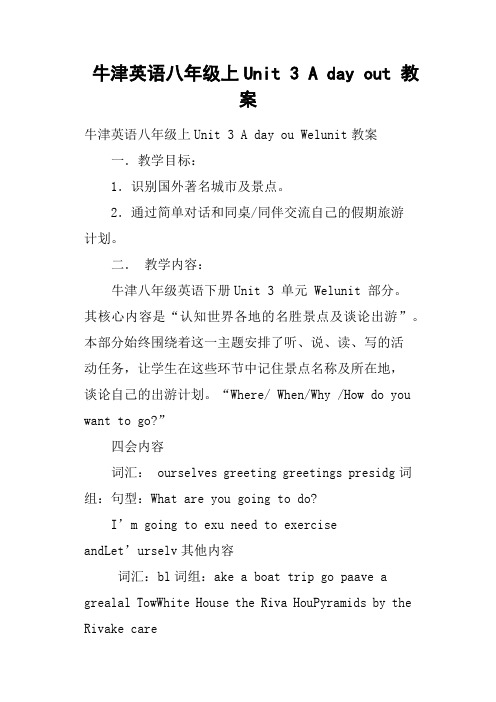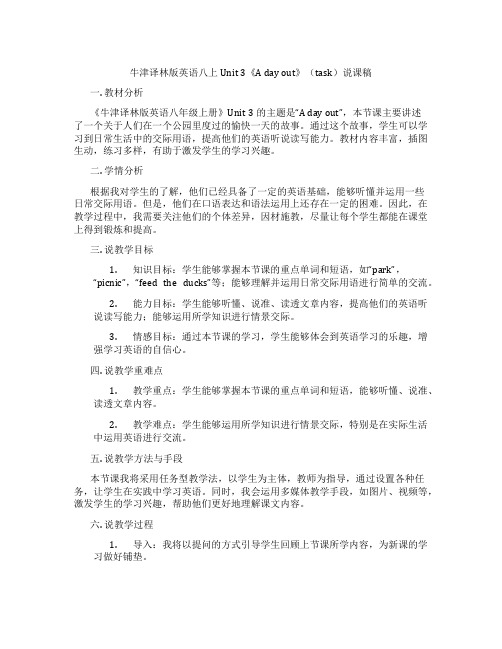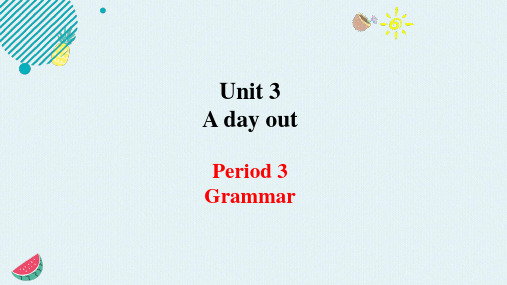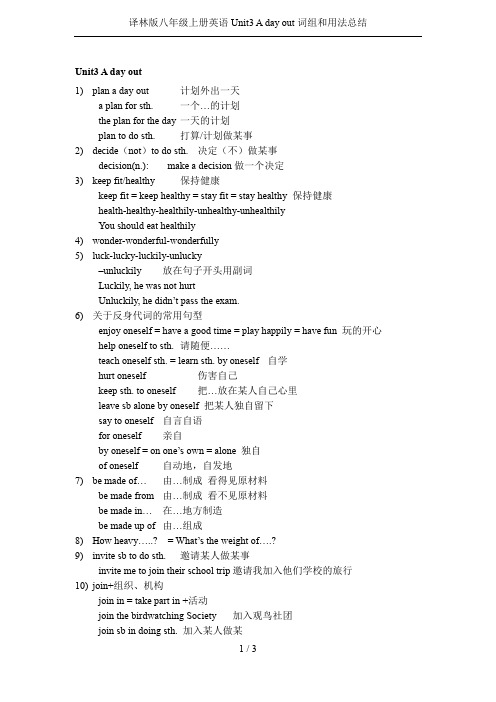八年级英语上册 Unit 3 A day out Period 3 Reading II教案 (新版)牛津版
牛津译林版八年级上册Unit 3《A day out》(Vocabulary)说课稿

牛津译林版八年级上册Unit 3《A day out》(Vocabulary)说课稿一. 教材分析《牛津译林版八年级上册Unit 3 A day out》是人教版初中英语教材的一个组成部分,本节课主要围绕“旅游”这一主题展开,通过描述不同地方的特色,让学生学会如何表达自己的旅游经历。
教材内容丰富,插图生动,有利于激发学生的学习兴趣。
同时,本节课还涉及到一些旅游相关的词汇和表达方式,有助于学生扩展词汇量,提高口语表达能力。
二. 学情分析根据我对学生的了解,他们大多数人都喜欢旅游,对不同地方的风景和文化充满好奇。
因此,本节课的主题能够激发他们的学习兴趣。
另外,学生已经掌握了基本的英语语法和词汇,具备一定的口语表达能力。
但是,他们在使用英语描述具体事物和表达个人经历方面还存在一定的困难,这是本节课需要解决的问题。
三. 说教学目标1.知识目标:学生能够掌握本节课所学的旅游相关词汇和表达方式,如“旅游”、“特色”、“参观”等。
2.能力目标:学生能够用英语描述自己的旅游经历,提高口语表达能力。
3.情感目标:通过本节课的学习,培养学生对旅游的热爱,增长见识,拓宽视野。
四. 说教学重难点1.重点:旅游相关词汇和表达方式的掌握。
2.难点:如何用英语描述自己的旅游经历,表达具体事物和个人感受。
五. 说教学方法与手段1.交际法:通过小组讨论、角色扮演等形式,让学生在实际语境中运用所学知识。
2.任务型教学法:通过完成具体任务,如描述旅游景点、规划旅游行程等,培养学生运用英语的能力。
3.情境教学法:利用插图、多媒体等手段,为学生创设真实的旅游情境。
4.激励评价法:及时鼓励和表扬学生的进步,提高他们的学习积极性。
六. 说教学过程1.导入:以一幅美丽的旅游景点图片吸引学生的注意力,引导学生谈论自己最喜欢的旅游地点。
2.新课呈现:通过展示教材插图,引导学生学习旅游相关词汇和表达方式。
3.实践环节:学生分组讨论,用英语描述自己曾经去过的旅游景点。
八年级英语上册 Unit 3 A day out教案 (新版)牛津版 教案

Unit32015-2016八年级第一学期2)Find out the route of the tripon the way at the WorldPark inside the park3) Some questionsWhat was the weather like?Where did Linda see the Golden GateBridge?Could Linda’s mother see the photos? Why?Step4:Role-playSuppose you are Linda, retell the day out to the WorldPark according tothe form. Work in pairs. Get some Ss to retell it.Step5:. Post-readingDiscussion (Group work)Divide the class into several groups. Have a discussion in groups. Showthe Ss some pictures. Each group chooses a picture to talk about the place of interest you want to visit best. 1) where to go 2) when to go 3) how to go4) why to go 5) what to see 6) how to feelEach group chooses a student to give us a report.Step6. Sum-upFrom this lesson, we have learnt how to talk about the place of interest we want to visit. We also learnt sth about the places of interest So we must love our world and study harder to make our world more and morebeautiful.Step7. Homework1. Finish the exercises on the paper.2. Write a letter to your close friend to tell him/her your pleasanttrip to a place of interest.2015-2016八年级第一学期2015-2016八年级第一学期2015-2016八年级第一学期2015-2016八年级第一学期2015-2016八年级第一学期Teaching procedures:Step 1: Brainstorming:Your class wants to organize a class trip, how to plan it? What items should you make sure?Time Place Activity transportation lunch cost…Step2:Lead-ina. Ask some questions in Integrated skills:1)When does the final start?2)Where will they watch the final?3)How will they get there?4)What do you think of the trip?b. DiscussionDiscuss the activities.Step3:Presentation。
牛津英语八年级上Unit_3_A_day_out_教案新部编本

You can also
Step5_:__当__堂__反__馈__见__导__学__案
___. I hope you will ________yourselve育s.人犹如春风化雨,授业不惜蜡炬成灰
See you soon.
_____
精品教学教案设计 | Excellent teaching plan
Hello, boys and girls. I’m your guide. Today I will take you to see _______. It’s in _______. There you can see _______. You can also ________. I hope you will ________yourselves. Step4:总结提升 Finish the postcard and try to find pictures or draw pictures for your
Discuss: Which place of interest do you want to go? Why? 阅读 31 页 A 部分的明信片并与正确的图片配对。回答:
Postcard 1
1 Who sent the first postcard ?
2 Which city did he go to?
任务三:Listen and answer the questions
1.Where does Linda come from?
育人犹如春风化雨,授业不惜蜡炬成灰
精品教学教案设计 | Excellent teaching plan
2.Whom did she go to the World Park with? 3.What was the letter about? Listen and finish Part B1 on Page 33. 任务四:Read and complete the notes(PartB2) Read and then say true or false(PartB3) 5. 任务五:Watch and answer the following questions. (1) Where did Linda go? (2) Who did she go with? (3) How long was the journey? (4) Did she enjoy the journey at the beginning? (5) How many models are there in the park? (6) Which places of interest did they say? (7) Which part did Linda think was also wonderful? (8) Where can Linda’s mother see the photos of the trip?
牛津英语八年级上Unit 3 A day out 教案

牛津英语八年级上Unit 3 A day out 教案牛津英语八年级上Unit 3 A day ou Welunit教案一.教学目标:1.识别国外著名城市及景点。
2.通过简单对话和同桌/同伴交流自己的假期旅游计划。
二.教学内容:牛津八年级英语下册Unit 3 单元 Welunit 部分。
其核心内容是“认知世界各地的名胜景点及谈论出游”。
本部分始终围绕着这一主题安排了听、说、读、写的活动任务,让学生在这些环节中记住景点名称及所在地,谈论自己的出游计划。
“Where/ When/Why /How do you want to go?”四会内容词汇: ourselves greeting greetings presidg词组:句型:What are you going to do?I’m going to exu need to exerciseandLet’urselv其他内容词汇:bl词组:ake a boat trip go paave a grealal TowWhite House the Riva HouPyramids by the Rivake care三.教学准备1.录音机2.多媒体四、学情分析及教学策略本课话题来自学生的生活经历,在以前的学习中,学生已经学习了许多动词短语及形容词,为表达提供了语言基础。
此外,学生已掌握了特殊疑问词Where/When/What/Why/How进行提问, 为本课的学习做了铺垫。
具有了学习本单元知识的认知前提,能自然的与本单元的话题衔接。
本部分内容贴近生活,学生比较容易进入角色。
因而,教师在课堂中应通过场景图片来促使学生积极地参与,在任务型教学活动中,使学生有话想说,有话可说,在完成各项任务的过程中自主学习语言,提高他们综合运用语言的能力,学会更好地与他人沟通。
使各层次的学生都有所收获。
五.教学步骤:呈现1 向学生提问:If you awhat are you going to do? 帮助学生练习I’m going to…待学生回答后问:What do youddie is going to d? 鼓励学生大胆猜测。
牛津译林版英语八上Unit3《Adayout》(task)说课稿

牛津译林版英语八上Unit 3《A day out》(task)说课稿一. 教材分析《牛津译林版英语八年级上册》Unit 3的主题是“A day out”,本节课主要讲述了一个关于人们在一个公园里度过的愉快一天的故事。
通过这个故事,学生可以学习到日常生活中的交际用语,提高他们的英语听说读写能力。
教材内容丰富,插图生动,练习多样,有助于激发学生的学习兴趣。
二. 学情分析根据我对学生的了解,他们已经具备了一定的英语基础,能够听懂并运用一些日常交际用语。
但是,他们在口语表达和语法运用上还存在一定的困难。
因此,在教学过程中,我需要关注他们的个体差异,因材施教,尽量让每个学生都能在课堂上得到锻炼和提高。
三. 说教学目标1.知识目标:学生能够掌握本节课的重点单词和短语,如“park”,“picnic”,“feed the ducks”等;能够理解并运用日常交际用语进行简单的交流。
2.能力目标:学生能够听懂、说准、读透文章内容,提高他们的英语听说读写能力;能够运用所学知识进行情景交际。
3.情感目标:通过本节课的学习,学生能够体会到英语学习的乐趣,增强学习英语的自信心。
四. 说教学重难点1.教学重点:学生能够掌握本节课的重点单词和短语,能够听懂、说准、读透文章内容。
2.教学难点:学生能够运用所学知识进行情景交际,特别是在实际生活中运用英语进行交流。
五. 说教学方法与手段本节课我将采用任务型教学法,以学生为主体,教师为指导,通过设置各种任务,让学生在实践中学习英语。
同时,我会运用多媒体教学手段,如图片、视频等,激发学生的学习兴趣,帮助他们更好地理解课文内容。
六. 说教学过程1.导入:我将以提问的方式引导学生回顾上节课所学内容,为新课的学习做好铺垫。
2.呈现:我会通过展示图片、播放视频等方式,引入本节课的主题,让学生整体感知课文内容。
3.精讲:我会在学生初步理解课文的基础上,讲解重点单词和短语,并通过例句、练习等方式,让学生充分理解和掌握。
八年级英语上册《Unit 3 A day out(第3课时)》教案

feel sick a main road between cities
at the beginning (反) lots of ca rs, buses, and trucks on roads
(1) It took half an hour to get to the World Pa rk from school. F
A day out
教学目标
1.读懂文章,了解此次游玩的基本情况
2 .复习和拓展有关世界名胜的知识。
教学重难点
学会用正确的形容词描述旅游的感受 。
集体备课
二次备课
教学过程:
一、教师解释课文中的重点、难点内容。
co achn. a bus (usu al ly with a single desk) for carrying passengers over long distances(长途汽车) by coach
教后记:
highwayn.(especially US) a main road between cities(城镇间的公路)
on the hiБайду номын сангаасhway
tripn.(travel from one place to another)
take a (school) trip to sw / go on a trip to / travel to sw / go travelling
成五大组,呈现表格,给每组的各个学生安排一个部分,让他们寻找描述Linda当天在不同地点所见到的人或物及不同阶段感受的形容词。
(2) Linda’s feeling:
At the beginning:Bored; sick
牛津译林版八年级英语上册Unit3Adayout单元知识点汇总词汇语法句型综合讲义

牛津译林版八年级英语上册Unit3Adayout单元知识点汇总词汇语法句型综合讲义牛津译林版八年级英语上册Unit 3 A day out单元知识点汇总Vocabulary1.enjoy oneself 玩的高兴[同义词:have a good time/have fun]-I am going to Beijing on vacation .-Enjoy yourself.2.Australia n.澳大利亚Australian n.澳大利亚人;adj.澳大利亚(人)的I am an Australian boy.3.president n.总统;总裁chairman/chairperson n.主席Being a president may be a little tired.4.辨析arrive/get to/reacharrive vi. 到达(不及物动词,加at/in/on再接地点);还可以指引申含义,“到来”get to: 到达(直接加地点)reach:vt 到达(直接加地点)She arrived in Beijing two hours ago.=She got to Beijing two hours ago.She reached Beijing two hours ago,When spring arrives,we usually take off thick clothes.5.finally adv.最后[同义词]:in the end/finally/at last/eventually6.can’t wait to do sth 迫不及待做某事Receiving the box,I couldn’t wait to open the box.7.get on 上车(大型的交通工具,尤其指bus,反义词get off) get in 上车(小型的交通工具,尤其指car,反义词get out of)8.take an interest in...对......感兴趣place of interest 名胜古迹9.main adj. 主要的What’s the main idea of the passage?10.culture n.文化cultural adj.文化的11.home page 主页12.luckily adv.幸运地Luckily,I passed the exam.13.support v.支持n.支持My father supports a big family.14.辨析take place和happentake place 发生;举行(不及物动词词组;按照计划举行)happen vi: 发生(不及物动词;出乎意料地发生,多指自然灾害)A sports meeting will take place next week.Great changes have taken place in our hometown over the years.An earthquake happened in Japan a few days ago.14.cheer vt.欢呼n.欢呼声;喝彩[cheers 干杯;再见;谢谢] cheer sb up 使......欢呼正跃cheer on 为......加油Cheers of encouragement are going on in the cinema.We all cheered the star.15.free adj.免费的;空闲的;自由的free of charge 不收钱for free 免费in one’s free time 在某人空闲的时间15.hope n.希望in the hope of...抱着......的希望in the hope that...怀着......的希望I am going to Suzhou in the hope of having a look at the Gardens.I am going to Suzhou in the hope that I can have a look at the Gardens.16.meaning n.意义meaningful adj.有意义的meaningless adj.无意义的mean v.意味着;意思是be of great meaning 很有意义=very meaningfulWhat’s the meaning of the gesture?=What does the gesture mean?17.taste n.味道,品味v .品尝linking verb. 尝起来I don’t like the taste of carrots.I can’t wait to taste the dishes.The noodles taste delicious.18.take care 保重;当心take care to do sth 当心做某事take care not to do sth 当心不要做某事take care that从句(从句多用一般现在时)当心...... Take care to spell every word right.Take care not to hurt your finger.19.fine adv.够好adj.身体好;天气好I am doing fine now.I am fine.It is a fine day.20.wide adj.宽的width n.宽度widen v.加宽The desk is about one meter wide.21.Internet n.网络on the Internet=on line=online 在网上surf the internet 网上冲浪22.rest n.休息;剩余vi:休息have a rest/ break 休息一会the rest of... 剩下所有的......I am tired,so I need to rest for a while.I am taller than the rest of the students in my class.23.final n.决赛[扩展] match 比赛(大型的比赛,通常指运动项目)competition n.竞赛(比赛的胜负通常一眼就能看出来)contest n.竞赛(由评委和裁判决定冠军的比赛)24.cost n.费用,成本[扩展] price n.价格value n.价值25.ticket n.票the ticket for the concert/fashion show 音乐会/时尚演出的门票the ticket to Shanghai 去北京的票[扩展] 以下的搭配中也有to 表示后置定语the answer to the question 问题的答案the solution to the problem 问题的解决措施the key to the door 门的钥匙(key表示‘答案,关键’等含义时,也用此搭配)the flight to Beijing 去北京的航班Grammar Focus反身代词I myselfyou yourself/yourselveswe ourselveshe himselfshe herselfit itselfthey themselves反身代词在句中通常做表语,宾语和同位语。
八年级英语上册 Unit 3 A day out话题写作范文 (新版)牛津版

Unit 3 A day out话题写作范文假如你是北京的李丽,下周你在哈尔滨读中学的表妹李兰要来北京旅游。
请根据以下提示,给她写一封信,并告诉她在北京旅游期间做一名文明的(wellmannered)中学生。
写作要点:1.欢迎她来北京。
2.介绍北京的情况。
(1)下周天气:白天最高温度超过33℃;(2)交通方式:最好乘坐地铁;(3)必去的名胜:长城。
3.对她在北京旅游期间如何做一名文明的中学生提出具体建议。
写作要求:1.不得使用真实的姓名和学校名称。
2.可适当加入细节,使内容充实,行文连贯。
3.字迹工整、语言精练、表达准确、条理清晰。
4.至少80词。
听,并跟读下列范文Dear Li Lan,How is everything going? I'm glad to hear that you are coming to Beijing this summer. Welcome to come here. I'll give you some suggestions on this travelling.Next week Beijing is going to be very hot. Sometimes the highest temperature is over 33℃. You'd better take an umbrella when you go out. As everyone knows, Beijing is a crowded city. And subway is one of the most convenient transportation in this city. So I advise you to take the subway to take around. Beijing is famous for the Great Wall,where I advise you to go. During your travel, don't throw litter everywhere and keep quiet in public. Only in this way can you be a wellm annered student.I believe your trip will be full of fun and I hope you will have a good time in Beijing!Best wishes!Yours,Li Li。
A day out Period 3课件(共24张PPT)牛津译林版八年级上册

23002
Reflexive pronouns
Singular myself yourself himself herself itself
Plural ourselves yourselves
themselves
1. 单数的反身代词以self结尾,复数的反身代词以selves结尾; 2. 第一人称和第二人称的反身代词是由形容词性物主代词加
anything exciting. 5. None of the _c_li_m__b_er_s_ (climb)stopped halfway. They kept trying.
23002
二、根据汉语意思完成下列句子。
1. 我怎样才能说英语说的跟你一样好? How can I speak English___a_s___ __w__el_l__ ___a_s___ ___y_o_u__, Rose? 2. 看!吉姆正在尽力地向树上爬去。 Look!Jim is__tr_y_in_g__ ___t_o___ __c_li_m_b__ ___u_p___the tree. 3. 请不要告诉其他任何一个人有关这个消息的情况。 Please don't___te_l_l ___ __a_n_y_o_n_e_ ___e_l_s_e__ ___ab_o_u_t__this information. 4. 我们必须保守我们自己的秘密。 We must__k_e_e_p__ ___th_e___ _s_e_c_r_e_t _ ___t_o___o_u_r_s_e_lv_e_s. 5. 现在很少有学生能自学英语。 Now few students can __l_e_a_rn___English by_th_e_m__se_l_v_e_s.
牛津译林版英语八上Unit3《Adayout》(integratedskills)说课稿

牛津译林版英语八上Unit 3《A day out》(integrated skills)说课稿一. 教材分析《牛津译林版英语八上Unit 3 A day out》是一篇关于周末活动的阅读文章。
通过描述作者在周末参观历史悠久的城市牛津的经历,让学生在阅读过程中了解英国的文化和历史背景。
这篇文章紧贴学生的生活实际,激发他们对英语学习的兴趣,并培养他们的阅读能力。
二. 学情分析针对八年级的学生,他们已经具备了一定的英语基础,对文章中的词汇和语法知识点有一定的了解。
但他们在阅读理解方面还需提高,特别是对长篇文章的阅读和理解能力。
此外,学生对英国文化和历史背景的了解相对较少,需要在教学过程中进行补充和引导。
三. 说教学目标1.知识目标:学生能够掌握文章中的核心词汇和短语,理解文章的主旨大意。
2.能力目标:学生能够提高阅读理解能力,学会从文章中获取和处理信息。
3.情感目标:学生能够激发对英国文化和历史的兴趣,培养跨文化交际的意识。
四. 说教学重难点1.重点:学生能够理解文章的主旨大意,掌握文章中的核心词汇和短语。
2.难点:学生能够运用阅读技巧,从文章中获取和处理信息,提高阅读理解能力。
五. 说教学方法与手段1.教学方法:采用任务型教学法,让学生在完成任务的过程中提高阅读理解能力。
2.教学手段:利用多媒体课件、图片、地图等辅助教学,帮助学生更好地理解文章内容。
六. 说教学过程1.导入:通过展示牛津大学的图片,引导学生谈论自己对英国文化的了解,激发学习兴趣。
2.阅读理解:学生自主阅读文章,完成相关练习题,教师引导学生讨论答案,解答疑问。
3.词汇学习:教师讲解文章中的核心词汇和短语,学生跟读并模仿发音。
4.文化背景:教师介绍英国文化和历史背景,帮助学生更好地理解文章内容。
5.小组讨论:学生分组讨论文章中的细节信息,锻炼合作能力和阅读理解能力。
6.总结:教师引导学生总结文章主旨,回顾所学知识点。
七. 说板书设计板书设计包括文章标题、核心词汇、短语以及教学重点句子。
译林版八年级上册英语Unit3 A day out词组和用法总结

Unit3 A day out1)plan a day out 计划外出一天a plan for sth. 一个…的计划the plan for the day 一天的计划plan to do sth. 打算/计划做某事2)decide(not)to do sth. 决定(不)做某事decision(n.): make a decision做一个决定3)keep fit/healthy 保持健康keep fit = keep healthy = stay fit = stay healthy 保持健康health-healthy-healthily-unhealthy-unhealthilyYou should eat healthily4)wonder-wonderful-wonderfully5)luck-lucky-luckily-unlucky–unluckily 放在句子开头用副词Luckily, he was not hurtUnluckily, he didn’t pass the exam.6)关于反身代词的常用句型enjoy oneself = have a good time = play happily = have fun 玩的开心help oneself to sth. 请随便……teach oneself sth. = learn sth. by oneself 自学hurt oneself 伤害自己keep sth. to oneself 把…放在某人自己心里leave sb alone by oneself 把某人独自留下say to oneself 自言自语for oneself 亲自by oneself = on one’s own = alone 独自of oneself 自动地,自发地7)be made of…由…制成看得见原材料be made from 由…制成看不见原材料be made in…在…地方制造be made up of 由…组成8)How heavy…..? = What’s the weight of….?9)invite sb to do sth. 邀请某人做某事invite me to join their school trip 邀请我加入他们学校的旅行10)join+组织、机构join in = take part in +活动join the birdwatching Society 加入观鸟社团join sb in doing sth. 加入某人做某take part in activities 参加活动11)take the underground/bus to….乘地铁/公车去=go to…by underground/bus12)take action to do sth. 采取措施做某事take action right away 立即采取行动13)take a course in DIY 参加DIY课程14)take Linda to the Summer Palace 带琳达去颐和园15)take a notebook with sb 随身携带笔记本16)take photos of…拍…的照片17)take care 保重18)be far (away) from 离…远数字+(away) from 数字和far不能同时使用19)a lot of traffic = busy traffic = heavy traffic繁忙的交通there is a lot of traffic = the traffic is very heavy/busy20)arrive at/in at是小地点,in是大地点;= reach = get to 如果没有地点,只能用arrive21)can’t wait to do sth等不及做某事22)get on/off the bus 上/下车23)in front of 范围外的前面24)in the front of 范围内的前面25)more than = over 超过26)pull up拉上去pull oneself up the rocks 攀岩27)final-finally,get to the final 进入决赛final形容词或副词final exam期末考试Finally, the clock strikes. 最后,钟敲响了。
八年级英语上册Unit3Adayout第3课时ReadingII教案新版

T:Today we will learn Unit 3 Reading(II).Please
look at our"Learning aim"(Then I read it slowly.)
T:Are you clear?
S:Yes.
T:Let's go on.
3.学会用正确的形容词描述旅游的感受。
教 学 设 计
Step 1:Daily greetings:
T:Good morning,everyone.
S:Good morning.
T:How are you?
S:I'm fine,thank you.And you?
T:I'm OK.Thank you.Sit down,please.
A. At;for B.in;in C. In;on D. To;on
( )3.Flying there_____us about two and a half hours yesterday.
A.cost B.spent C.paid D.took
( )4. Here comes the train.Let’s________.
A.to get it B.to get on it C.get it on D.get on it
Class Exercise (二)
板书设计
Unit 3 A day out
课后反思
Step5:Show"Guide Three"to the students.
Guide Three
Read the email with your deskmate.
牛津译林版八年级英语上册Unit3AdayoutReadingI优秀教学案例

教师将设计一系列富有启发性的问题,引导学生进行思考、讨论和分享。这些问题将围绕课文内容展开,旨在帮助学生理解文章细节,把握文章主旨,并运用所学知识解决实际问题。同时,问题导向法还能激发学生的求知欲,培养他们独立思考和解决问题的能力。
(三)小组合作
本节课将采用小组合作的学习方式,让学生在合作中共同完成任务。教师将根据学生的英语水平和个性特点进行合理分组,确保每个学生都能在小组中发挥自己的优势。小组合作任务包括:讨论公园游玩的经历、分享阅读心得、共同完成写作任务等。通过这种方式,学生将学会倾听、表达、沟通和协作,提高他们的团队合作能力。
(四)反思与评价
在教学过程中,教师将引导学生进行自我反思和互相评价。学生需要思考自己在课堂上的表现、学习方法的运用以及与小组成员的合作情况。同时,教师鼓励学生积极参与评价,学会欣赏他人的优点,并提出建设性的意见。此外,教师还应及时给予学生反馈,肯定他们的进步,指出需要改进的地方,帮助学生不断提高。
四、教学内容与过程
(一)导入新课
在导入环节,教师首先通过展示一张公园的全景图片,引发学生的好奇心和兴趣。接着,教师提出问题:“Can you guess where we are going to have a day out?”,让学生预测本节课的主题。随后,教师播放一段关于公园游玩的视频,让学生观察并描述视频中的人物和活动。通过这种方式,教师自然地引出本节课的主题——描述一次公园游玩的经历。
4.学生能够运用所学知识,进行口头和书面表达,描述自己或他人的一次公园游玩经历。
(二)过程与方法
1.通过情境教学法,让学生在具体的语境中感知、体验和运用英语,提高他们的语言实践能力。
2.运用任务型教学法,引导学生进行小组合作,培养学生团队合作精神和解决问题的能力。
英语:Unit3《Adayout》Reading3课件(牛津译林版八年级上)

5
2
4
We saw models of many places of interest from all over the world.
1
The trip was boring. Kitty and Linda felt sick for most of the trip.
3
We all got off the coach quickly.
models not real[ ri:l]
stones
metal[‘metl] (金属)
the pyramids the Eiffel Tower the Golden Gate Bridge
Welcome to Linda' s home page(主页
) It was a great day! I went with my friends to
ቤተ መጻሕፍቲ ባይዱ
Pre-reading
the song and dance parade places of interest
the Golden Gate Bridge
the pyramids
the Eiffel Tower
['pir?midz ]
in Egypt ['i:d?ipt]
Pre-reading
Welcome to the World Park
Welcome to Daniel ' s Place!
Hi,everyone!Welcome to my
home page .
Take a look at the photos of our school trip to the World Park in Beijing.I
八年级英语上册 Unit 3 A day out Period 3 Reading II教案

U3 A day outContent: Reading (2)Teaching aims and demands:1. To work out the structure of each sentence2. To master all the language points in the reading pa rt3. To retell the story in their own words, following the organization of the passage Key points and difficult points:1. To master all the language points in the reading part2. To retell the story in their own words, following the organization of the passage Teaching aids:A tape recorder , some pictures and a small blackboard.Teaching methods:Discussing and explanationPreview work1 Read after the tape until you can read the text fluently.2 Translate the following phrases into English.1)环球一天2)邀请我加入去世纪公园的学校旅行团3)在开始4)迅速地上长途车5)从学校到世界公园的旅行乘长途车需2小时6)交通拥挤(很多车辆)7)旅途的大部分时间感到恶心8)由金属制成9)不再感到恶心10)100多个来自世界各地的名胜模型11)看起来像真的12)相信某人的眼睛13)加入我们跳舞的行列14)自学怎样制作旅行的主页15)把照片放在网上给大家看16)玩得很开心17)在城市道路上18)整个世界19)歌舞游行20)从一个地方到另一个地方旅行Teaching procedures:Step 1. 预习作业&预习交流1. Read aloud the passage 可采取竞赛机制(分组齐读------ 个人朗读----- 教师点评朗读中的停顿、连读等注意点)2. Check the answers to the phrases by themselves.(小组核对----- 集体巩固)1)around the world in a day2)invite me to join the school trip to theWorld Park3)at the beginning4)get on the coach quickly5)The trip from the school to the World Parktook about two hours by coach6) a lot of / much / lots of traffic7)feel sick for most of the trip8)be made of metal9)don’t feel sick any more10)models of over a hundred places of interestfrom all over the world11)look real ( look like a real one)12)believe one’s own eyes13)join us in the dancing14)teach oneself how to make a home page forthe trip15)put photos on the Internet for everyone tolook at16)have a good time // enjoy oneself17)on the city roads18)the whole world19)song and dance parade20)travel from one place to anotherStep2. 交流展示&点拨提高(一)Reading and finishing Part B on P42 .1. Ask students to read the conversation on their own.2. Ask students to replace the underlined phrases with the correct words.3. Ask students to compare answers in pairs.1) trip 2) traffic 3) highway 4) sick 5) the Eiffel Tower6)Pyramids(二)Finishing Part C on P 431. Finish C1 as a class competition or a test.Ask students to listen to the teacher and correct the false sentences with books closed.1) F 2) F 3) F 4) T 5) F 6) F 7) T2. Talk to students about a home page to focus their attention on Reading C2. Then ask themto put the pictures in the correct order on Daniel’s home page . ( 5 2 4 1 3)(三) Explaining some language points and do some exercises.1.enjoy oneself= have fun =have a wonderful time在昨天的旅行中我们玩得很开心.We enjoyed ourselves(had a good tine / had great fun ) during yesterday’s trip.2.invite sb. to do sth.我好友邀请我和他一起参观长城My good friend invited me to visit the Great Wall with him.3.at the beginning= at first in the end= at last= finally飞机旅行一开始,我们很害怕. At the beginning of the plane trip, we felt very afraid.4.get on the coach / get on it老人一上车,长途车就启动了.The coach started as soon as the old man got on..5.The trip from Kitty’s school took about two hours. (同义句)It took about two hours from Kitty’s school to the World Park .6.not…any more= no moreI did not feel sick any more. (同义句) I felt sick no more.7.in front of/ in the front of (选词组填空)To my surprise, our teacher is sitting in front of me.The driver is sitting in the front of the school bus.8.over(more than) a hundred places of interest (interesting places)from all over the world看到如此多来自世界各地名胜的模型很有趣.It’s interesting to see models of so many places of interest from all over the world.9.look like the real one / look real画上的那匹马看起来像真的The horse in the picture looks real / looks like a real one.10.I taught myself how to make a home page. (同义句)I taught myself how I could make a home page.11.put the photos on it for everyone to look at.没什么担心的事There is nothing to worry about.12.for yourself你不会相信这岩石会变色直到你亲眼看见You won’t believe that the rock changes its color until you see it for yourself.2Step 3 检测反馈一首字母填空:1. He spent the w___________ morning helping me with my study. How helpful!2. Look at the clouds in the s___________. It’s going to rain, I think.3. The Great Wall is one of the most f_____________ places of i_____________ in China.4. Are you interested in the p_________ in Egypt? They were made of many big s__________5. The model train looks like the r____________ one.6. At about 8 o’clock, the t_____________ on the roads is very busy.7. Do you know the m____________ idea of the article? Yes. It’s easy to understand.8. When I take a bus or a c____________, I often feel sick and it seems that food is going toco me up from my s____________.9. The Eiffel Tower is a tall m_____________ building in Paris.10. At the b___________ of the trip, I didn’t enjoy m_________. But later, I found it wonderful. 二句型转换:1. We’re having a good time now.(同义句) We’re __________ __________ now.2. He became interested in science when he was five. (同义句)Science _________ ________ when he was five.3. Last year, they learned driving by themselves. (同义句)Last year, they _________ ________ driving.4. At last, we got to the World Park..(同义句)_______, we _______ _______ the World Park..5.There was too much movement of cars on the city roads. (同义句)There _________ a lot of ___________ on the city roads.三、完成句子:1. 从我校出发旅行坐长途客车用了四个多小时.The trip ________ my school ________ ________ four hours ________ coach.2.这个埃菲尔铁塔模型是用金属做的The ________ Eiffel Tower ________ ________ ________ ________ .3. 他总是不诚实,我再也不相信他了.He is always dishon est. I _________ believe him ___________ ___________.4. Tom 找了个便宜的房间住Tom found a cheap room _________ ___________ ______.5.我感觉天快下雨了I feel that it _________ __________ ___________ _________.Step 4 Homework1. Try to master the new words and phrases2. Write the text with own words and retell it.Preview workMemorize some places of interest and different kinds of transport.课堂评价小结教学反思:。
- 1、下载文档前请自行甄别文档内容的完整性,平台不提供额外的编辑、内容补充、找答案等附加服务。
- 2、"仅部分预览"的文档,不可在线预览部分如存在完整性等问题,可反馈申请退款(可完整预览的文档不适用该条件!)。
- 3、如文档侵犯您的权益,请联系客服反馈,我们会尽快为您处理(人工客服工作时间:9:00-18:30)。
U3 A day outContent: Reading (2)Teaching aims and demands:1. To work out the structure of each sentence2. To master all the language points in the reading part3. To retell the story in their own words, following the organization of the passage Key points and difficult points:1. To master all the language points in the reading part2. To retell the story in their own words, following the organization of the passage Teaching aids:A tape recorder , some pictures and a small blackboard.Teaching methods:Discussing and explanationPreview work1 Read after the tape until you can read the text fluently.2 Translate the following phrases into English.1)环球一天2)邀请我加入去世纪公园的学校旅行团3)在开始4)迅速地上长途车5)从学校到世界公园的旅行乘长途车需2小时6)交通拥挤(很多车辆)7)旅途的大部分时间感到恶心8)由金属制成9)不再感到恶心10)100多个来自世界各地的名胜模型11)看起来像真的12)相信某人的眼睛13)加入我们跳舞的行列14)自学怎样制作旅行的主页15)把照片放在网上给大家看16)玩得很开心17)在城市道路上18)整个世界19)歌舞游行20)从一个地方到另一个地方旅行Teaching procedures:Step 1. 预习作业&预习交流1. Read aloud the passage 可采取竞赛机制(分组齐读------ 个人朗读----- 教师点评朗读中的停顿、连读等注意点)2. Check the answers to the phrases by themselves.(小组核对----- 集体巩固)1)around the world in a day2)invite me to join the school trip to theWorld Park3)at the beginning4)get on the coach quickly5)The trip from the school to the World Parktook about two hours by coach6) a lot of / much / lots of traffic7)feel sick for most of the trip8)be made of metal9)don’t feel sick any more10)models of over a hundred places of interestfrom all over the world11)look real ( look like a real one)12)believe one’s own eyes13)join us in the dancing14)teach oneself how to make a home page forthe trip15)put photos on the Internet for everyone tolook at16)have a good time // enjoy oneself17)on the city roads18)the whole world19)song and dance parade20)travel from one place to anotherStep2. 交流展示&点拨提高(一)Reading and finishing Part B on P42 .1. Ask students to read the conversation on their own.2. Ask students to replace the underlined phrases with the correct words.3. Ask students to compare answers in pairs.1) trip 2) traffic 3) highway 4) sick 5) the Eiffel Tower6)Pyramids(二)Finishing Part C on P 431. Finish C1 as a class competition or a test.Ask students to listen to the teacher and correct the false sentences with books closed.1) F 2) F 3) F 4) T 5) F 6) F 7) T2. Talk to students about a home page to focus their attention on Reading C2. Then ask themto put the pictures in the correct order on Daniel’s home page . ( 5 2 4 1 3) (三) Explaining some language points and do some exercises.1.enjoy oneself= have fun =have a wonderful time在昨天的旅行中我们玩得很开心.We enjoyed ourselves(had a good tine / had great fun ) during yesterday’s trip.2.invite sb. to do sth.我好友邀请我和他一起参观长城My good friend invited me to visit the Great Wall with him.3.at the beginning= at first in the end= at last= finally飞机旅行一开始,我们很害怕. At the beginning of the plane trip, we felt very afraid.4.get on the coach / get on it老人一上车,长途车就启动了.The coach started as soon as the old man got on..5.The trip from Kitty’s school took about two hours. (同义句)It took about two hours from Kitty’s school to the World Park .6.not…any more= no moreI did not feel sick any more. (同义句) I felt sick no more.7.in front of/ in the front of (选词组填空)To my surprise, our teacher is sitting in front of me.The driver is sitting in the front of the school bus.8.over(more than) a hundred places of interest (interesting places)from all over the world看到如此多来自世界各地名胜的模型很有趣.It’s interesting to see models of so many places of interest from all over the world.9.look like the real one / look real画上的那匹马看起来像真的The horse in the picture looks real / looks like a real one.10.I taught myself how to make a home page. (同义句)I taught myself how I could make a home page.11.put the photos on it for everyone to look at.没什么担心的事There is nothing to worry about.12.for yourself你不会相信这岩石会变色直到你亲眼看见You won’t believe that the rock changes its color until you see it for yourself.Step 3 检测反馈一首字母填空:1. He spent the w___________ morning helping me with my study. How helpful!2. Look at the clouds in the s___________. It’s going to rain, I think.3. The Great Wall is one of the most f_____________ places of i_____________ in China.4. Are you interested in the p_________ in Egypt? They were made of many big s__________5. The model train looks like the r____________ one.6. At about 8 o’clock, the t_____________ on the roads is very busy.7. Do you know the m____________ idea of the article? Yes. It’s easy to understand.8. When I take a bus or a c____________, I often feel sick and it seems that food is going tocome up from my s____________.9. The Eiffel Tower is a tall m_____________ building in Paris.10. At the b___________ of the trip, I didn’t enjoy m_________. But later, I found it wonderful. 二句型转换:1. We’re having a good time now.(同义句) We’re __________ __________ now.2. He became interested in science when he was five. (同义句)Science _________ ________ when he was five.3. Last year, they learned driving by themselves. (同义句)Last year, they _________ ________ driving.4. At last, we got to the World Park..(同义句)_______, we _______ _______ the World Park..5.There was too much movement of cars on the city roads. (同义句)There _________ a lot of ___________ on the city roads.三、完成句子:1. 从我校出发旅行坐长途客车用了四个多小时.The trip ________ my school ________ ________ four hours ________ coach.2.这个埃菲尔铁塔模型是用金属做的The ________ Eiffel Tower ________ ________ ________ ________ .3. 他总是不诚实,我再也不相信他了.He is always dishonest. I _________ believe him ___________ ___________.4. Tom 找了个便宜的房间住Tom found a cheap room _________ ___________ ______.5.我感觉天快下雨了I feel that it _________ __________ ___________ _________.Step 4 Homework1. Try to master the new words and phrases2. Write the text with own words and retell it.Preview workMemorize some places of interest and different kinds of transport.课堂评价小结教学反思:。
